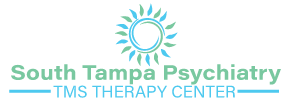Bipolar disorder is a mental health disorder that causes extreme mood swings that range from depressive lows to manic highs. It is typically split into Bipolar 1 and Bipolar 2. Bipolar 1 is when a person experiences manic episodes but not a major depressive episode. Conversely, Bipolar 2 involves a major depressive episode, and the high end of the mood swings are often less intense than a full manic episode, called hypomania. Call South Tampa Psychiatry today at 866.273.5017 to learn how our bipolar disorder treatment center can help you or a loved one.
Bipolar Symptoms
Bipolar disorder’s symptoms are typically split into two groups: manic and depressive. Manic symptoms include excessive energy, euphoria, sleeplessness, distractibility, and impaired judgment.
Meanwhile, depressive symptoms include:
- Pervasive sadness or hopelessness
- Insomnia or excessive sleep
- Fatigue or lack of energy
- Suicidal thoughts
Bipolar disorder differs from most mental health disorders in that one set of its symptoms can sometimes be perceived as positive by those dealing with them. People with bipolar disorder may become attached to manic periods, feeling like they are more productive and on a high. But bipolar is characterized by the duality of its symptoms, and a depressive episode is rarely far away from a manic period.
What Does Bipolar Disorder Treatment Include?
Bipolar disorder treatment focuses on managing symptoms since it is a chronic disorder. Treatment options range from medication and therapy up to in-patient care, depending on the severity of the disorder and a person’s current symptoms.
One critical method for managing bipolar disorder is medication, with the type and amount prescribed varying based on a patient’s current needs. Some of the most common medicines used in treating bipolar are mood stabilizers, antipsychotics, and antidepressants.
The other common treatment method for bipolar disorder is psychotherapy. Three of the most helpful therapies are:
- Interpersonal and social rhythm therapy, which supports patients in building and maintaining a routine to support mood management
- Cognitive-behavioral therapy, which identifies negative thought patterns and works to replace them with more positive ones
- Family-focused therapy, which engages close family members in the treatment plan as a critical support system
The best way to determine what treatment will work for your unique symptoms is to contact a bipolar disorder treatment center.
Bipolar Disorder Treatment at South Tampa Psychiatry
South Tampa Psychiatry specializes in treating bipolar disorder through our bipolar disorder treatment center. Our center treats Bipolar 1, Bipolar 2, and cyclothymia. Cyclothymia is a milder form of bipolar that involves cyclical mood swings. However, the highs and lows are both less severe and do not qualify as mania or major depression.
We use four key modalities in treating all forms of bipolar disorder:
- Transcranial magnetic stimulation (TMS) therapy
- Medication management
- Psychotherapy
- Cognitive-behavioral therapy
Beyond those four priorities, we support all our patients in lifestyle management to keep symptoms and episodes to a minimum. Creating routines and positive habits are critical to managing bipolar disorder. This can involve getting on an exercise regimen, eating a healthy diet, maintaining a regular sleep schedule, and avoiding drugs or alcohol.
One aspect of our treatment protocols that sets us apart from other service providers is TMS therapy. It is a non-invasive technique that sends magnetic pulses to targeted areas in the brain that directly impact the neurological causes of bipolar disorder. Treatments last an hour or less and involve the patient wearing a metal coil on their head. Side effects are largely nonexistent, with the most common of them being a slight headache following a treatment session that quickly dissipates.
Achieve Healing at South Tampa Psychiatry
Wherever you are in your mental health journey, South Tampa Psychiatry is here to help you heal and get back to living a productive life. Our licensed medical professionals are ready to support your mental health recovery. Contact us at 866.273.5017 today to take advantage of our expertise in treating bipolar disorder and its symptoms.







